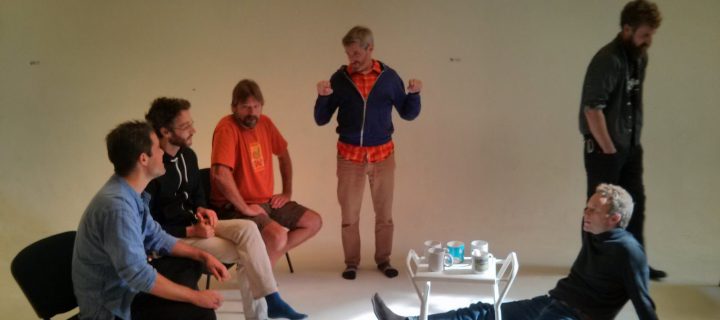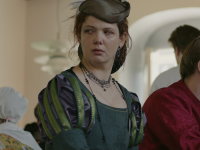Take your mind back, I don’t know when
Sometime when it always seemed
To be just us and them
Girls that wore pink
And boys that wore blue
Boys that always grew up better men
Than me and you
Real Men is a chamber larp for 4–8 players, lasting four hours, designed by Kevin Burns and Mo Holkar. It’s about the lives and friendships of men – taking a group of characters who meet as young adults, and following them through thirty years as events befall them and their relationships evolve and develop.
The precursor to Real Men is a similar game, known variously as Women on the Verge… or These Are the Days of Our Lives, in which players build a group of female characters and trace their friendship as their lives develop.
When we started working together on a parallel larp for men, we decided to focus on the challenges men have in friendship: in being vulnerable to each other; in showing their feelings; and in asking for and receiving help. Male difficulty in communicating, and the pressure that patriarchal society places upon men to behave in a certain range of ways, became major themes of the Real Men game.
Manhood and Masculinity
Kevin reflects on masculinity: “When I was young I didn’t feel that being a man in a patriarchal sense had much to offer, and it’s only since I turned 40 that I’ve begun to try to explore and reclaim an authentic masculinity. This has led me to participate in men’s groups, to playing the masculinity guru Kohana in Just a Little Lovin’ (Denmark 2015), and to writing Real Men with Mo.”
One of the design problems in the larp was the confusion around ‘maleness’ and ‘masculinity’. As an example of this, consider these words by 1990s masculinity guru Marvin Allen[1]Quoted in Steve Biddulph Manhood (1998) p 33.:
I like to think what I do is masculine – when I hold a little baby and kiss it, that’s the masculine part of me holding that little baby. When I have tears because I’m scared, or because I’m full of joy, they’re all masculine. There’s not a female thing about them.
If a man can only have ‘masculine’ qualities, then masculinity simply means ‘anything pertaining to males’ and this makes it difficult to explore the question. In the 2015 runs of Real Men, in Lewes, UK and at Grenselandet in Oslo, we saw that the (all-male) players struggled with this problem.
We had to find a way to displace the default gender.
 It was not until the third run in Lewes (7th May 2016), after a major rewrite, that we were able to make headway with this. The ancient Chinese concept of Yin-Yang allowed us to decouple behaviours from physical gender. Instead of ‘masculine’ we used Yang, and ‘feminine’ became Yin. In Real Men, Yang behaviour is about dominance, status, outward expression and career; while the Yin aspect is a man’s inner life, his emotionality, his soulful quality, his sensitivity, his secret vulnerability and longing.
It was not until the third run in Lewes (7th May 2016), after a major rewrite, that we were able to make headway with this. The ancient Chinese concept of Yin-Yang allowed us to decouple behaviours from physical gender. Instead of ‘masculine’ we used Yang, and ‘feminine’ became Yin. In Real Men, Yang behaviour is about dominance, status, outward expression and career; while the Yin aspect is a man’s inner life, his emotionality, his soulful quality, his sensitivity, his secret vulnerability and longing.
We adapted the ‘metabox’ meta-technique, which allows players to give their character’s internal monologue, which we renamed the ‘Yin-Yang Meta-technique’. Players could be as Yang as they wished outwardly, and use this technique to show their hidden Yin qualities of vulnerability, fragility and self-doubt.
The second important difference with this run was that it involved female players (4 men, 3 women). Having women involved meant spelling out what it meant to be a man. In the workshop players were taught how to be Yang – taking up space, dominating a room or conversation, establishing status. “At last, we felt we had found a way to play with being a man,” says Kevin.
Gender and Sexuality
It should be stressed that we talk about the characters in Real Men (and the related games with female characters) from the point of view of gender as binary, because that’s predominant in the 1980s culture from which the characters emerge. However, questioning binarity, and every other aspect of gender which young people take as given, is an important part of the larp’s potential. The characters start Real Men generally perceived as male, but that can cover or develop into a range of genderqueerness, which players may wish to explore. And players of any or of no gender can, we hope, get an interesting and valuable experience from the larp.
We should also note that the characters’ sexuality isn’t prescribed or suggested. Each player can define their character’s sexuality as they wish, and again the journey of exploring that as it develops is one that we hope will be a productive one.
The Game
The game spans 30 years, beginning in the 1980s of the Joe Jackson song ‘Real Men’, redolent of that decade’s confusion around male identity, masculinity and sexuality.
What’s a man now, what’s a man mean?
Is he rough or is he rugged?
Is he cultural and clean?…
Time to get scared, time to change plan
Don’t know how to treat a lady
Don’t know how to be a man
The characters are then aged nineteen and have just completed their schooling. Another innovation in the most recent run was that the first scene takes place following a meeting the characters have attended of the ‘Real Man Group’. This group is the brainchild of James Tyler, a post-feminist masculinity guru, and it opens the characters’ minds to new possibilities in being men. Tyler doesn’t have all the answers, and turns out to have feet of clay, but he has sown a seed in which some of the characters may grow.
Subsequent scenes, each of 30 minutes, and accompanied by a period-appropriate soundtrack, were set in the 1990s, 2000s, and in the present day, as the characters, who have become friends, reunite in various situations to explore their relationships and reflect on their life’s journey over the previous decade. James Tyler’s suicide rocks their belief in him, leading some to question more deeply, and others to cynicism. Throughout, the song ‘Real Men’ is used as a focus. The meaning of the song’s lyrics – its questioning approach to the perception of masculinity – will shift for each player, as their character evolves through the scenes towards middle-age.
Character Psychology
Kevin, who has a background in psychotherapy, created a new approach to character psychology for the game. Each character (see example below) was assigned a secret fear which signified a deep psychological issue that would drive behaviour over a whole lifetime. The characters were offered two responses to the fear: The first was a fantasy, which was the vain hope that they could simply avoid dealing with the problem; and the other was a dream, which was a vision of life in which others would be less likely to suffer in the way that the character had.
T_______
The Showman
Your secret fear (unknown even to yourself): ‘I’m worthless’.
This compels you to perform and prove yourself constantly.
Your fantasy is fame, success and adulation.
The impossible dream is that your ordinariness will be accepted.
So for example, a character with a secret fear of ‘I’m worthless’ would have the fantasy that he could convince others of his value, thus avoiding the pain of the wound; however, the dream would involve a deeper engagement with the fear of worthlessness, and perhaps inspire a life’s work helping people who are seen as worthless by mainstream society.
The Future of Real Men
In response to comments from players, we are in the process of developing Real Men from its current four-hour extent into a one-day experience. The pre-game workshop would consist mainly of a recreation of the imaginary ‘Real Man Group’, with exercises in which the characters talk to each other about their fears, fantasies and dreams. Afterwards we will leave time for a full debrief. Real Men will be aimed at the general public and at mixed gender groups.
Kevin is working on a short film based on Real Men in collaboration with artist Christian Thompson.
Player Responses
We will end with some anonymised player responses, which say better than we can what the impact of Real Men was. All seven players in the latest run wrote at least one piece about their experience.
On reflection there is something of my Dad in Peter. I didn’t feel loved by my father. He abused me when I was young. He thought I was there to serve him in some way I guess. He was dark and mysterious and very unavailable. He became more available when he had been drinking; only the next day to return to a dark, morose character, working hard and not there for his family. I feel such compassion when I think of my Dad and Peter. How would their lives be different if they had experienced a fully loving and present father; and how would mine be, too?
I’ve been feeling a lot of bleed about the larp… it was an interesting and intense play experience. The way that Shaun felt intimidated by Peter and Mick, and his discomfort when the banter and teasing turned towards him, flashes me back to my own youthful experiences of trying to fit in with groups of young men who were generally more yang-forward than me. And the way that gaining confidence with age led to him making a considerable arsehole out of himself, confusing arrogance with self-belief; that was I guess a writ-large version of the stupid and sometimes unkind things that I did, once I’d come into myself a bit more. (And, sadly, continue to do occasionally, when I’m not being thoughtful).
The paradox is that his secret fear was overcome not by his compulsion or his fantasy (to dominate others), but by laying them aside. This paradox, however, would be unresolvable by Mick: he could not see that he had found the significance and status that he desperately sought. A conception of masculinity that became clear to me as I played, is that it is a suit of armour (or, more accurately, a variety of suits of armour) that one puts on.
Mick simply could not bear the feeling of nakedness and vulnerability that came from being without his armour.
…
So what have I learned – if anything – about myself?
Masculinity as armour: do I have this? If there is any doubt, one has only to read what I have written here. When trying to talk openly and sincerely about myself, I adopt a sort of hyper-formality (note the obsessive disinclination to dangle prepositions, for example). This is like a shield that keeps ‘too much truth’ at a distance, and protects my vulnerability. Perhaps this is something that I need to work on.
(See what I did there?)
Yesterday was very emotional, powerful and touching. I can’t even begin to unravel it.
I wrote a letter to Dean this morning asking him if he’d be my friend. I realised I have disowned the part of myself that is him quite substantially.
He may need time to answer.
I imagined climbing a mountain with him and holding his lonely hand as we looked at the view silently…
My father, much like Dean’s character, was a runaway. I met him at 22. This week he wrote to me like a lost little boy to tell me his partner is dying.
It’s hard to know how to support someone so not present… not even to themselves.
All of my sadness around this played out in a colossal text argument with my boyfriend when I got home who is also going through huge father stuff. His father has cancer.
The argument was good though. I let Dean speak and be his total arsehole self and it was a release.
Something got released.
Real Men
Credits: Designed by Kevin Burns and Mo Holkar; GMed by Kevin Burns
Dates: 4 Oct 2015 (Lewes), 31 Oct 2015 (Grenselandet, Oslo), 7 May 2016 (Lewes)
Length: 4 hours
Players: 4–8
Game Mechanics: meta-box for internal monologues; music for timing
This article was initially published in The Nordic Larp Yearbook 2015 published by Rollespilsakademiet and edited by Charles Bo Nielsen, Erik Sonne Georg, et al.
Cover photo: Tommy (centre) welcomes his friends to his beachside villa. Real Men playtest, Lewes, UK; by Kevin Burns. 4th October 2015. All other photos from the second Lewes run, 7th May 2016, by Christian Thompson. All photos provided by the authors.
References
| ↑1 | Quoted in Steve Biddulph Manhood (1998) p 33. |
|---|










